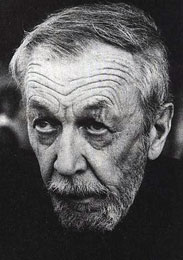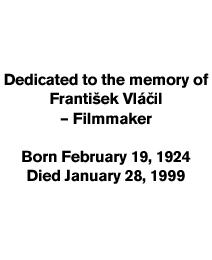 A short excerpt from the Booklet essay by Peter Hames
A short excerpt from the Booklet essay by Peter Hames
In a survey of Czech film critics held in 1998,
Marketa Lazarová was voted the best Czech film ever made. In the same year its director, František Vláčil, received a lifetime achievement award at the Karlovy Vary Film Festival. It therefore comes as something of a surprise that neither the film nor its director feature prominently in general histories of the cinema.
František Vláčil (1924-99) was not a member of the famous Czech New Wave of the 1960s, nor a product of the Prague Film School (FAMU). He originally studied art and aesthetics in Brno before working in both puppet and documentary film. This was followed by a stint in the Czech Army Film Unit, where he made over 30 instructional films and documentaries. He first attracted international attention with his poetic documentary,
Skleněná oblaka (
Glass Skies, 1957), which was awarded a prize at the Venice Film Festival. His fiction debut,
Pronásledování (
Pursuit aka
Persecution), was part of a two episode feature,
Vstup zakázán (
No Admittance, 1959). It was followed a year later by his feature debut,
Holubice (
The White Dove, 1960), which won further awards at Venice, for Vláčil and his cinematographer, Jan Čuřík.
With
Marketa Lazarová, Vláčil approached a novel by Vladislav Vančura, which was first published in 1931. Vančura, one of the leading Czech novelists, was a member of most of the experimental art movements of the period and was the first chair of the avant garde Devětsil group. He was also a prolific author of (unfilmed) screenplays, and had directed or co-directed five feature films in the 1930s. In his film work, he aimed to take cinema in new formal directions, experimenting with both sound and montage in such films as
Na sluneční straně (
On the Sunnyside, 1933) and
Marijka nevěrnice (
Faithless Marijka, 1934), the last of which featured acclaimed composer Bohuslav Martinů’s only film score. Vančura’s novels emphasised the poetic and experimental use of language. As a result, it presented obvious problems for film adaptation, although Jiří Menzel successfully brought two of Vančura’s other novels to the screen as comedies:
Rozmarné léto (
Capricious Summer, 1967) and
Konec starých časů (
The End of Old Times, 1989).
While
Marketa Lazarová was inspired by Vančura’s novel, it remains very different. A short text has been converted into a vast epic that bears comparison, in different ways with each, to Kurosawa’s
Shichinin no Samurai (
Seven Samurai, 1954) and Tarkovsky’s
Andrei Roublëv (1966). It was also inspired by motifs from Vančura’s
Obrazy z dějin národa českého (
Pictures from the History of the Czech Nation, 1939-40). And if Vančura’s original novel provided no historical clues and was designed to be autonomous, Vláčil’s film was set very specifically in the mid-13th century, a time he attempted to evoke with the utmost accuracy.
Peter Hames' complete Essay, from which this excerpt is taken, appears in the Booklet of the DVD release.

